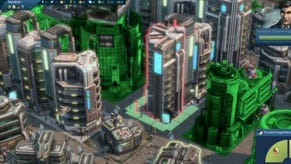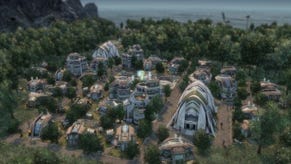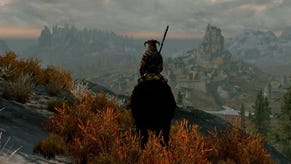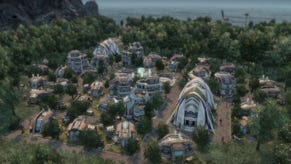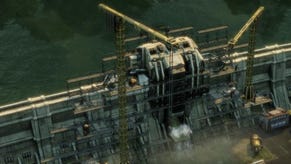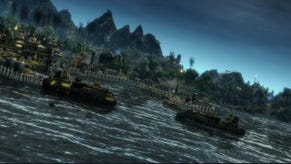Wot I Think: Anno 2070
Near-Future Real Estate
Blue Byte and Related Designs recently finished their latest trading and building game, Anno 2070 - this time set in later part of the current century, in a world where climate politics underlie the tale of commercial striving - and released it onto the wild seas of the internet. I've been wading through its depths for the past week or so and I am now able to tell you Wot I Think.
The Anno games exhibit a formula that is unusual without ever being weird. That is to say they are uncommon within the general landscape of games, but nonetheless unexotic as experiences. Essentially they are about building towns and reaping resources, with a hint of high-seas naval activity. The limits to this are what makes the challenge of them interesting.
Anno works like so: Building relies on a meticulous tech tree in which technologies are only unlocked if the right kinds of people live in your settlements. "Levelling up" neighbourhoods (a sort of formalised gentrification) is essential to accessing the higher tiers of the tree. The collection of resources cannot, as in most RTS games, be done in isolation, either. Trading, with merchants, and with other factions, is essential. Most limited of all is conflict. There is some capacity to make war with your little navy, but it's all but relegated to occasional missions and the most tenuous end-game situations. Not an afterthought as such, but certainly at the bottom of the list.

All this is true of Anno 2070, which blasts out of the traditional historical setting to create a game set in the future, and against a backdrop of global climate disaster. It feels extraordinarily similar to its immediate predecessor, Anno 1404, with your time split between city building and resource tinkering (which you do most of the time) with a bit of pootling about controlling a ship to perform various errands on the side. Unlike 1404, however, it's all gone a bit techno-futurist, and your activities are conducted from an "Ark", a giant submersible which can be used a generalised mobile base and trading platform.
There are two main factions: Eco dudes and smoke-belchers. Actually they're called The Eden Initiative and The Global Trust, but you get the idea. There's a third way, too, with the SAAT, who are like a super-techno faction who built themselves a new life under the sea. These act a median between the two sides, and are unlocked once you've tackled the large chunk of the game. These give you the option of building underwater, which is certainly a new frontier for the game, although really quite similar to building on the surface.
Peculiarly, given its hot-topic setting and polar factions, there is almost no real difference between choosing the dirty industrialists over the eco dudes, and no palpable reward for being "green" over eating the planet, aside from the specific bonuses that each has inherent to it. The structure of the game is much the same no matter which side you choose, it's just that the cities you build will be a little different. I am not quite sure why this should be. I feel like the game is leaping in at the deep end of contemporary issues and then just treading water. It should, I feel, have gone somewhere, or said something, about either possible ethos. But it says little.

Instead this eco stuff plays into the "world" state you find yourself in. During sandbox games (and the freeform sandbox "continuous mode", plus single scenario missions are very much the heart of things here) offers a bunch of diplomatic options, and how these are managed by you and the other factions can have direct effect on factional economies. This system also spawns various missions, which you can get involved in for rewards. Fighting pirates, for example, is something that all factions can get involved in - crucial if you are playing a multiplayer game. (Which, for the sake clarity, I should state that I did not.) Underlying all activity on your part are the demands and production values of various buildings - obviously different for different factions - the balancing of which will keep you engaged.
The heart of the game: colonising islands, building, growing, maintaining, has quite a serious challenge to it. Keeping a colony fed and supplied is tricky business, and the knife-edge balance required for continued expansion remains at the heart of the game. That's a satisfying process, partly because it's quite intricate, and feels like you mastered it when you get it right, but also because you find yourself rewarded by presiding over a teeming near-future town. People wander along the boulevards, flying things buzz over the rooftops to deliver packages across town, while the exo-suit that Ripley pilots at the end of Aliens can be seen felling trees in the forest.
The visual design of Anno's brave new world is a delight. Detailed, animated, and even features some eccentricities, such as the high-seas hobo circus aircraft carrier which acts as a neutral merchant ship. The more functional bits, such as the UI, are less pleasing. The tech tree is a bit clunky, with a popout "this makes this and needs this" chain for certain sets of buildings, which just seems like a big signpost popping out of the interface and pointing to busywork. The sci-fi cliche of virtual female holographic assistant with a synthetic-sounding voice (unimaginatively dubbed E.V.E.) seems to act as a marker for the limits of Anno's imaginative scope. Not that it matters, of course, because I just wanted another game of building cute towns, but it feels like it could have gone further.

Where Anno actually fails, perhaps, is in making enough of the tools it offers. Settling islands - and doing it competitively with the other factions - is enormously satisfying, but Anno 2070 had me wanting more. Perhaps it was the inconsistency of the setting, but I would like to have had some way of achieving something greater than the few goals supplied by the single missions (build the biggest building on the tech tree, for instance) or the weak storyline supplied by the campaign.
Or perhaps I'm Anno'd out after the series highpoint of 1404. Objectively I suspect this is actually the stronger game, because there's just a lot more to it. There's tonnes of content, loads of little ideas and flourishes, and the random missions/diplomacy/dynamism of the maps with other factions in works really well. It also offers scope to play the game pretty much as you'd please (from pacifist paving of islands, to entirely aggressive cut-throating) and only really falls down on the lack of a story to sew up the loose ends of its setting. The campaign is, as expected, an expansive tutorial.
Anyway, I need to offer some kind of conclusion about the game, some kind of summary of its value, and I find that as tricky as I did with 1404. Writing about the Anno games is treacherous, because while they are relatively straightforward to play, they are also an oddly acquired taste, and as such slippery to define. The building game here is unlike that of SimCity or CitiesXL, because it is more like a puzzle than a genuine builder. The active aspect of using ships and interacting with other factions also makes this something like a sandbox RTS, only it lacks the usual RTS elements of unit-pumping conflict. This is largely a peaceful series, and as such hugely refreshing. It is one of those games that delights in systems, and entertains us by allow us to play with this systems, and make a toy of its peculiarly land-hungry colonisation process. I think you'll know if this is likely to satisfy a particular void in your gaming experiences.

However, as a shortcut to my obligations as a reviewer, I would insist on the demo if you are intrigued, and suggest that you get this immediately if you enjoyed 1404. The only thing you might obviously object to is the Ubi-launcher needing to fire you each time you play. Once again, for a game available inside Steam, it's another layer we don't want or need. But you know how that goes...
Anno 2070 is out now.




